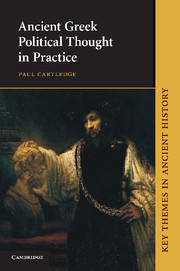Book contents
- Frontmatter
- Contents
- Preface
- Acknowledgements
- Timeline
- CHAPTERS AND NARRATIVES
- 1 Meaning in context: how to write a history of Greek political thought
- 2 The Greek invention of the polis, of politics and of the political
- Narrative I The prehistoric and protohistoric Greek world, c. 1300–750 BCE
- Narrative II The archaic Greek world, c. 750–500 BCE
- Narrative III The classical Greek world I, c. 500–400 BCE
- Narrative IV The classical Greek world II, c. 400–300 BCE
- Narrative V The Hellenistic Greek world, c. 300–30 BCE
- Narrative VI ‘Graecia capta’ (‘Greece conquered’), c. 146 BCE – CE 120
- APPENDIX I Selected texts and documents
- APPENDIX II The ‘Old Oligarch’: a close reading
- Bibliographical essay
- References
- Index
Narrative II - The archaic Greek world, c. 750–500 BCE
Published online by Cambridge University Press: 05 June 2012
- Frontmatter
- Contents
- Preface
- Acknowledgements
- Timeline
- CHAPTERS AND NARRATIVES
- 1 Meaning in context: how to write a history of Greek political thought
- 2 The Greek invention of the polis, of politics and of the political
- Narrative I The prehistoric and protohistoric Greek world, c. 1300–750 BCE
- Narrative II The archaic Greek world, c. 750–500 BCE
- Narrative III The classical Greek world I, c. 500–400 BCE
- Narrative IV The classical Greek world II, c. 400–300 BCE
- Narrative V The Hellenistic Greek world, c. 300–30 BCE
- Narrative VI ‘Graecia capta’ (‘Greece conquered’), c. 146 BCE – CE 120
- APPENDIX I Selected texts and documents
- APPENDIX II The ‘Old Oligarch’: a close reading
- Bibliographical essay
- References
- Index
Summary
May god be kind [?]. This has been decided by the polis: when a man has been Kosmos, for ten years that same man shall not be Kosmos. If he should become Kosmos, whatever judgements he passes, he himself shall owe double, and he shall be disempowered as long as he lives, and what he does as Kosmos shall be as nothing. The oath-swearers [shall be] the Kosmos, the Damioi and the Twenty of the polis.
The foregoing text was inscribed on a humble block of schist limestone some time in the second half of the seventh century bce. It was laid out in boustrophedon (‘as the ox ploughs’) style, back and forth across the stone. It has a good claim to constituting the oldest extant inscribed law from Greece, as old almost as the laws ascribed to the earliest lawgivers that are attested by (usually much later) literary sources. One of those lawgivers reputedly came from Crete: an entirely plausible claim, insofar as a large number of the earliest physically attested laws do also. The text we have quoted is from Drerus in eastern Crete.
Drerus was never any great shakes in the larger picture of ancient Greek history, never a major player on any big or bigger stage. The presence in this early text, therefore, of three words (kosmos, polis; the third is Damioi, from damos = ‘people’) with deep significance for the development of Greek political thinking and practice tells its own story.
- Type
- Chapter
- Information
- Ancient Greek Political Thought in Practice , pp. 41 - 45Publisher: Cambridge University PressPrint publication year: 2009



